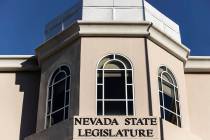Sandoval’s education funding proposal has merit
Nevadans know that our education system is broken and in need of fixing. When it comes to graduation rates, per-student spending, and teacher-to-student ratios, Nevada ranks among the lowest in the country. But these statistics only tell part of the story. Not only is our education system failing our kids and limiting their future opportunities, it is having a direct effect on the state’s near-term and long-term economic growth.
Our poor education system is the No. 1 reason businesses looking to relocate or expand to Southern Nevada choose to locate in other regions. Of the 251 companies that the Las Vegas Global Economic Alliance worked with last year, 85 of them chose not to come to our region because of our education and workforce systems. Former Gov. Richard Bryan got it exactly right in his testimony to the Legislature when he said, “Education is a top priority for businesses relocating to our state,” and we lose when we don’t adequately fund education.
Our ability to attract job-creating business is inextricably linked to the educational offerings, and vice versa. On the one hand, new businesses require a skilled and entrepreneurial workforce, and relocating employees also seek attractive school districts for their children. On the other hand, in order for our K-12 education system to be successful, Nevada’s parents need good jobs that enable them to take a more active role in their children’s education, and schools must offer competitive wages to attract the best teaching talent.
Republicans and Democrats at the state level know these issues well, and there is broad-based support for reform. Many in the business community, including the board of the LVGEA, have endorsed the reforms Gov. Brian Sandoval has put forward. The question before us now — as it has been for some time — is how to pay for it.
The governor’s proposal is not the first set of ideas introduced to fund education. Just last year, the Education Initiative, also known as the margins tax, sought to raise more than $1 billion over Nevada’s two-year budget cycle to fund education. We opposed that idea. The margins tax was defeated for good reason: It would’ve caused Nevada substantial economic harm, and there was no clear plan for how the extra funding would help our education system.
Let me be clear: the governor’s plan is not the same as the margins tax on the ballot. Gov. Sandoval’s plan finds an appropriate middle ground, creating a broad-based, simple funding solution while guaranteeing far greater accountability by tying money to categorical spending that will track a measurable return on investment.
The proposal in question will alter Nevada’s $200 business license fee to a tiered system with rates from $400 to $4 million, adjusting to the type and scale of the business. According to research we commissioned, the changes in the adjusted business license fee would have a comparatively negligible effect on our economic growth, and because the new revenue generated by the business license fee would go to research-based education programs, the benefits to the education system and to our economy by association are incontrovertible.
The governor’s business license fee legislation is far from a “blank check” for education. Instead, the approximately $440 million raised by the adjusted business license fee would be allocated to specific programs designed to address our most pressing areas of concern, from English-language learners to the achievement gap.
The current crisis in education is due in large part to the fact that our state’s education funding formula was principally established in 1967 and has not been updated since. Meanwhile, our taxation system has not been significantly updated since the 1980s. In the ensuing decades, we have not done enough to meet the needs of our adapting and rapidly growing population, which is considerably larger, poorer and less English-speaking than it was when these laws were written. Gov. Sandoval’s proposed legislation goes beyond a simple funding increase through programs focused on our most needy areas. It is not a $440 million blank check.
It may not be a perfect bill, and certainly we understand that the Legislature may amend it, but as long as it ultimately does not harm economic development, we stand ready to support legislation that couples reform, revenue and a measurable return on investment.
Tom R. Skancke is chief executive officer of the Las Vegas Global Economic Alliance, the regional economic and community development organization for Southern Nevada.























